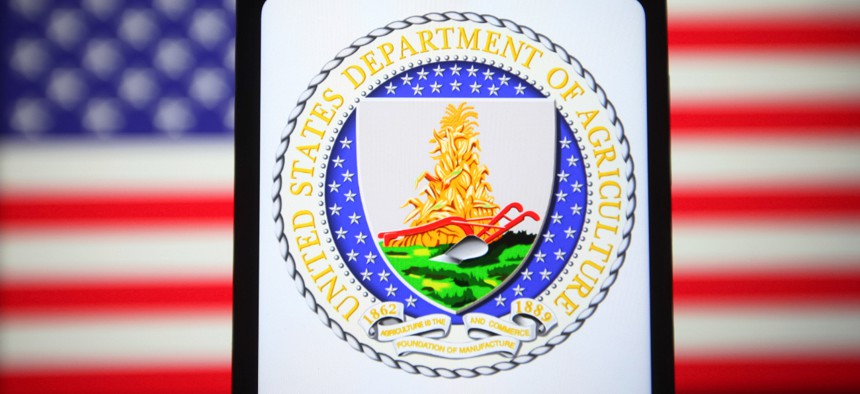
According to GAO, the agencies have lost institutional knowledge and suffer from stark declines in diversity. Photo Illustration by Pavlo Gonchar/SOPA Images/LightRocket via Getty Images
Although USDA Agencies that Relocated to Kansas City Have Recovered from Staff Exoduses, Their Diversity Hasn’t
The Agriculture Department’s Economic Research Service and National Institutes of Food and Agriculture shed more than half their workforces following their relocation from Washington to Kansas City.
The Government Accountability Office last week found that the Agriculture Department failed to follow leading practices in several respects related to its relocation of two science agencies to Kansas City during the Trump administration.
The report marks the second by the watchdog agency related to the controversial decision to move the Economic Research Service and the National Institutes of Food and Agriculture from Washington, D.C., to Kansas City in 2019. GAO’s first look at the move found that although the Agriculture Department had set up an evidence-based process for relocations, it chose not to follow it and ultimately failed to account for attrition costs in its cost-benefit analysis.
Attrition was a major problem resulting from the relocation, as both agencies lost more than half of their staff in the move. In its new report, GAO said that although the two agencies have rebounded from the exoduses, reaching comparable pre-relocation staffing levels in fiscal 2022, the agencies have lost institutional knowledge and suffer from stark declines in diversity.
“Between the end of fiscal year 2018 and the end of fiscal year 2021, the proportion of Black or African American staff decreased from 22% to 9% at ERS, and from 47% to 19% at NIFA,” GAO wrote. “At the same time, the number and proportion of white employees increased from 63% to 75% at ERS, and from 38% to 65% at NIFA.”
The upheaval led to a significant loss of productivity at both agencies, with ERS-published journal articles and research reports falling by half between fiscal 2018 and 2020, and NIFA experienced delays in the processing and funding of grants during the same period.
GAO reported that the two research agencies were able to staff up to pre-relocation levels in part thanks to the expansion of telework and remote work during the COVID-19 pandemic.
“In March 2022, USDA officials noted that remote work and location flexibility had helped with recruiting and, in June 2022, NIFA officials said that recruiting for positions with permanent remote duty stations seemed to have increased the candidate pool for hiring,” GAO wrote. “Between August 2021 and May 2022, NIFA hired 71 employees into positions with a permanent remote duty station. ERS hired five employees into permanent remote duty stations in April 2022.”
In analyzing the Agriculture Department’s implementation of the relocations, GAO found that the department failed to follow a number of “leading practices” when conducting a major organizational reorganization or reform. Specifically, the department failed to engage with employees or other stakeholders, like Congress, ahead of its decision to move the agencies, and did not conduct campaigns to secure buy-in from employees who would be forced to move or quit their jobs.
“According to USDA officials, USDA leadership told ERS and NIFA managers not to collect employee input as they developed the relocation and that leadership would not consider recommendations from the agencies’ employee advisory groups on the relocation or site selection,” the report stated. “Such employee input, along with considering the potential loss of employees as a factor in relocating, could have informed decisions about where and when to relocate, which might have helped USDA mitigate some attrition from this relocation.”
GAO recommended that the department hew more closely to leading practices when considering the reorganization or relocation of its agencies, and it suggested that the department should revise its regulations to ensure that departmental regulations governing those decisions also cover the Agriculture secretary.
“USDA officials told us that the decision to relocate ERS and NIFA away from the national capital region was the sole decision of the secretary and that existing department guidance does not apply to such secretary-initiated agency reforms,” GAO wrote. “[Expanding] the scope of the departmental regulation on reorganizations to apply to all reorganizations, including those initiated by the secretary, would further improve USDA decision-making during future agency reorganizations. It would also increase employee acceptance of such efforts and help USDA better assess its reform proposals to ensure that they are implemented effectively.”
In its response to the report, USDA officials said they “generally agree” with its findings, and they are already working “proactively” to implement GAO’s strategic workforce planning recommendations.







